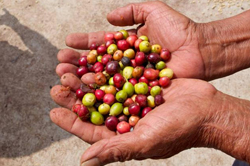In 2010, a 12 oz. bag of coffee cost about $7. Today, it’s closing in on $10. Why the increase in the cost of caffeine?
As Tommy Bassett, director of the Just Trade Center, explained, “Production has gone down drastically over the last several years because heavy rains have been coming during the flowering stage of the coffee plants. Heavy rains knock the flowers off, and it’s in the flowers that the bean develops.”
Café Justo (Just Coffee) is a coffee cooperative founded by Presbyterians who migrated to Agua Prieta, Sonora, Mexico (across the border from Douglas, Ariz.), the staff and board of Frontera de Cristo (a Presbyterian Border Ministry site located in Agua Prieta), and many U.S. Presbyterians. The Just Trade Center was founded to expand the model of Café Justo to other cooperatives and countries.
Bassett is primarily concerned with conditions in Mexico, where Café Justo growers live. But lower harvests are reported in nearly every coffee growing region and the culprit — untimely rain — is the same.
Rains are coming more often during harvest and drying season.
“When the berries are hit with hard rain, they fall off the bushes and cannot be efficiently harvested. If the beans [which are removed from the berries to dry] get rained on while drying, the beans get moldy,” Bassett said. “The losses are significant.”
On the commodities market, the costs of beans has risen from less than a dollar a pound last year to $2.20-$2.50 now. This market tracks the price for berries before they’ve had any processing. The commodities market is also subject to swings caused by large bidders who project wildly varying scenarios.
For Café Justo, commodities pricing is not the concern. Café Justo, working on a different model, pays $2.60 per pound for the dried bean. While growers in the cooperative do more of the work — removing the pulp and drying the beans — they also get more for their product, one of Just Coffee’s goals.
Adrian Gonzales, director of customer relations at Café Justo, said, “In the past we really did not do a very good job of looking at costs. Our main concern was with the growers and processors and what they needed to make a living. We hadn’t taken account of other costs well.”
Now the cooperative has developed a better approach for tracking and analyzing costs so that it’s not influenced by the commodities pricing and can be interpreted to the growers.
“None of us are accountants or economists. One of our grants last year enabled to learn better how to do accounting,” Gonzales said.
“At this time, we expect to raise our prices, but in the present market, our prices are going to be good in relation to the large processors,” he said. “Our growers and roasters are happy with where we are, but we have to raise prices to protect our growers and our processors and their jobs.”

Just Coffee dried and ready to roast.
The challenge for Café Justo, which sells about 60,000 pounds of coffee a year, is to maintain a model of just economics. The cooperative seeks to provide growers and processors a living wage and Social Security. When harvests decrease, Café Justo raises prices for growers to provide them a steady income. But while the markets provide information, Café Justo cannot be market-driven. It wants to be able to assure it is dealing with member needs.
Café Justo is about more than economics. It builds understanding between the growers in Chiapas, Nayarit and Vera Cruz and those who market the coffee — mostly U.S. churches — through border-to-border delegations organized through the Just Trade Center. Said one consumer in the United States, “When you drink the coffee and learn about the process that gives you that drink, it transforms your perspective not just on coffee and food production. You discover just how much our lives affect one another. Drinking Just Coffee makes us feel like true neighbors.”
Parrish W. Jones, Ph.D., lives in St. Augustine, Fla., and is a minister at large in the Presbytery of St. Augustine. He has been a mission volunteer for Frontera de Cristo and in Colombia. He speaks and writes on mission, immigration, border ministry and Colombia.

